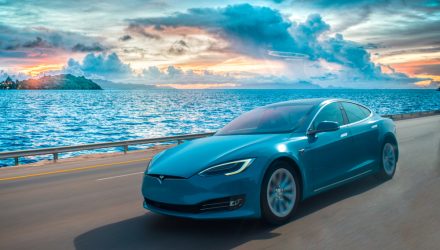Tesla Battery Day is in the books and while the event may have left some investors wanting more, there are some positive implications for the stock and exchange traded funds with large allocations, including the ARK Autonomous Technology & Robotics ETF (CBOE: ARKQ).
Notably, Elon Musk said the company is on pace to deliver $25,000 cars within three years, drive battery costs lower by 56% and boost battery output by three terawatt hours by 2030.
“Following Battery Day, ARK analyzed whether these innovations put Tesla on a new cost decline curve, or whether our Wright’s Law analysis for lithium-ion batteries had predicted this cost decline,” said ARK analyst Sam Korus in a recent note. “We have concluded that, given its battery breakthroughs, Tesla is sustaining Wright’s Law, not only lowering costs by 56% on a $/kWh basis but also increasing range by 54%, thanks to vertical integration that we believe is unparalleled in the industry.”
Investors can capture growth through quick advancements in technological developments. In an attempt to hone in on the potential opportunities, one should consider the criteria used to identify a disruptive innovation and look to an ETF strategy that adapts to the changes.
Wooed by Wright’s Law
At its core, Wright’s Law is used to forecast cost declines as a result of increasing efficiencies in cumulative output. Specific to electric vehicle producers, such as Tesla, batteries are tipping points. Increased efficiencies in battery production should drive costs lower, benefiting manufacturers and investors along the way.
“The decline in prices has opened up new segments of the auto market to lithium-ion batteries which, in turn, is pushing them toward an even larger market, utility-scale energy storage,” according to ARK.
Speaking of efficiencies, Tesla may be showing its steps ahead of rivals by focusing on dollars per range and vehicle performance. That could be a long-term driver for the stock and funds, including the aforementioned ARKQ.
“While the industry considers $/kWh the critical competitive variable, Tesla may be parting company with its EV competition by focusing on dollars per range and vehicle performance,” notes Korus. “From ARK’s perspective, $/kWh measures the point at which EVs will reach price parity with gas powered cars, without considering performance. Bottom line, Tesla seems to be leaving the competition even further behind.”
For more on disruptive technologies, visit our Disruptive Technology Channel.
The opinions and forecasts expressed herein are solely those of Tom Lydon, and may not actually come to pass. Information on this site should not be used or construed as an offer to sell, a solicitation of an offer to buy, or a recommendation for any product.

